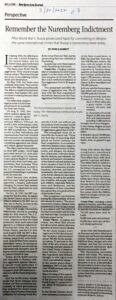David Ginsburg was a 1935 Harvard Law School graduate who became an important New Deal lawyer. In 1939, his boss William O. Douglas, chairman of the U.S. Securities and Exchange Commission, was appointed to the Supreme Court. Ginsburg accompanied Justice Douglas as his first law clerk.
In Fall 1939, after Nazi Germany invaded Poland, Ginsburg moved into war-related work in Washington. In 1943, he enlisted in the U.S. Army. During the next three years, he served in Europe.
On June 10, 1944—four days after D-Day, and seventy years ago today—Captain Ginsburg in Europe wrote a short letter to Justice Douglas at the Supreme Court.
Ginsburg began by referring to a White Paper that the British Government had published on May 26, 1944. It outlined policies to maintain high and stable employment in Britain after the war. “If the White Paper was important on D-10 [i.e., the day of its release, which turned out to be “D minus ten”],” Ginsburg wrote, “I suppose it’s doubly important on D+4.”
In the heart of his letter, Ginsburg wrote this comment about wartime—
We’ve worked really hard during the past few months, but it still doesn’t seem hard enough. The trouble is that war just doesn’t lend itself to any real equality of sacrifice.
David Ginsburg lived until 2010. It was a long, very consequential life—for the Washington Post’s obituary, click here, and to download a eulogy that I had the honor to deliver at a memorial service, click here.
Ginsburg’s 1944 observation about wartime and, implicitly, about the unequal burdens of military service lives on. It seems particularly relevant to discussions today about the U.S. Department of Veterans Affairs and the quality of care and support that the U.S. owes to those who have made the greatest sacrifices.







